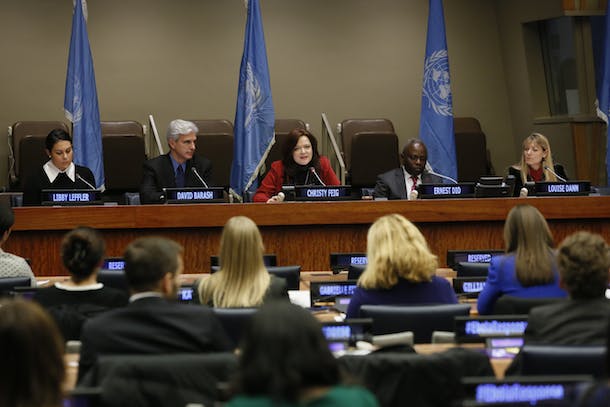
As the world’s attention began to focus more heavily on the Ebola outbreak in West Africa beginning in August 2014, global businesses also started taking note of the crisis and taking stock internally of what they could do to assist. According to the UN Global Compact, which has been tracking private sector donations for the past several months, businesses have contributed or pledged nearly $300 million to the global Ebola response. At a meeting last week focused on UN-business collaboration for the response, UN Special Envoy on Ebola David Nabarro stated, “The private sector has an absolutely vital role to play and has been doing so.”
The event, hosted by the UN Global Compact and the United Nations Foundation, particularly highlighted the work of the Ebola Private Sector Mobilization Group, which has worked to ensure that companies remain in the affected countries and actively protect not only the jobs but also the health and wellbeing of their employees there. But the dialogue extended far beyond the work of this group to include the efforts of many companies around the world – even those that don’t work directly in the affected countries.
Topics of discussion during the meeting at UN headquarters ranged from using innovative practices such as mobile banking to ensure payments to health workers on the frontlines to the unprecedented speed of collaboration with large pharmaceutical companies on the development and testing of Ebola vaccines and treatments. Other private sector participants spoke of using their organization’s unique capacities – such as logistics expertise for UPS, the deep tech background of the Paul Allen Family Foundation, or the unique power of connectivity provided by Facebook – to make a significant impact on the Ebola response. These voices were paired with high-level participants from UN organizations such as the World Food Programme (WFP), the United Nations Populations Fund (UNFPA), the UN Development Programme (UNDP), the World Health Organization (WHO), and the UN Children’s Fund (UNICEF). In every case, speakers emphasized the tremendous importance of involving the private sector in the response and the fact that the UN cannot hope to beat the outbreak without considerable cross-sector support.
The event was also a sobering reminder that the devastating health consequences of the outbreak are only part of the picture. The spread of the Ebola virus has also devastated the affected countries’ economies – economies that were recently considered, as one speaker put it, “the pearls in the crown of Africa’s success.” Many participants implored the attendees to do their part, or encourage their organization to do its part, to ensure the disease does not undermine the economic progress and vitality of Guinea, Liberia, and Sierra Leone. Though the road from Ebola response to recovery is still a long one with many challenges to overcome, the event offered reason to be optimistic about how engaged the private sector will be – both in the continuing response efforts and the inevitably hard work of recovery that will follow.



 View All Blog Posts
View All Blog Posts